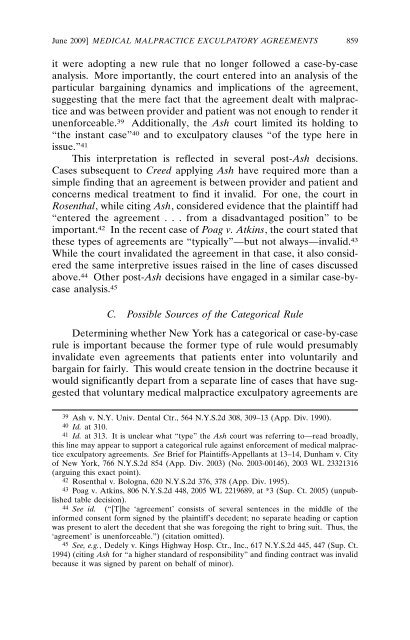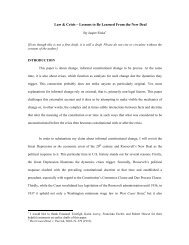In Search of an Enforceable Medical Malpractice Exculpatory
In Search of an Enforceable Medical Malpractice Exculpatory
In Search of an Enforceable Medical Malpractice Exculpatory
You also want an ePaper? Increase the reach of your titles
YUMPU automatically turns print PDFs into web optimized ePapers that Google loves.
June 2009] MEDICAL MALPRACTICE EXCULPATORY AGREEMENTS 859<br />
it were adopting a new rule that no longer followed a case-by-case<br />
<strong>an</strong>alysis. More import<strong>an</strong>tly, the court entered into <strong>an</strong> <strong>an</strong>alysis <strong>of</strong> the<br />
particular bargaining dynamics <strong>an</strong>d implications <strong>of</strong> the agreement,<br />
suggesting that the mere fact that the agreement dealt with malpractice<br />
<strong>an</strong>d was between provider <strong>an</strong>d patient was not enough to render it<br />
unenforceable. 39 Additionally, the Ash court limited its holding to<br />
“the inst<strong>an</strong>t case” 40 <strong>an</strong>d to exculpatory clauses “<strong>of</strong> the type here in<br />
issue.” 41<br />
This interpretation is reflected in several post-Ash decisions.<br />
Cases subsequent to Creed applying Ash have required more th<strong>an</strong> a<br />
simple finding that <strong>an</strong> agreement is between provider <strong>an</strong>d patient <strong>an</strong>d<br />
concerns medical treatment to find it invalid. For one, the court in<br />
Rosenthal, while citing Ash, considered evidence that the plaintiff had<br />
“entered the agreement . . . from a disadv<strong>an</strong>taged position” to be<br />
import<strong>an</strong>t. 42 <strong>In</strong> the recent case <strong>of</strong> Poag v. Atkins, the court stated that<br />
these types <strong>of</strong> agreements are “typically”—but not always—invalid. 43<br />
While the court invalidated the agreement in that case, it also considered<br />
the same interpretive issues raised in the line <strong>of</strong> cases discussed<br />
above. 44 Other post-Ash decisions have engaged in a similar case-bycase<br />
<strong>an</strong>alysis. 45<br />
C. Possible Sources <strong>of</strong> the Categorical Rule<br />
Determining whether New York has a categorical or case-by-case<br />
rule is import<strong>an</strong>t because the former type <strong>of</strong> rule would presumably<br />
invalidate even agreements that patients enter into voluntarily <strong>an</strong>d<br />
bargain for fairly. This would create tension in the doctrine because it<br />
would signific<strong>an</strong>tly depart from a separate line <strong>of</strong> cases that have suggested<br />
that voluntary medical malpractice exculpatory agreements are<br />
39 Ash v. N.Y. Univ. Dental Ctr., 564 N.Y.S.2d 308, 309–13 (App. Div. 1990).<br />
40 Id. at 310.<br />
41 Id. at 313. It is unclear what “type” the Ash court was referring to—read broadly,<br />
this line may appear to support a categorical rule against enforcement <strong>of</strong> medical malpractice<br />
exculpatory agreements. See Brief for Plaintiffs-Appell<strong>an</strong>ts at 13–14, Dunham v. City<br />
<strong>of</strong> New York, 766 N.Y.S.2d 854 (App. Div. 2003) (No. 2003-00146), 2003 WL 23321316<br />
(arguing this exact point).<br />
42 Rosenthal v. Bologna, 620 N.Y.S.2d 376, 378 (App. Div. 1995).<br />
43 Poag v. Atkins, 806 N.Y.S.2d 448, 2005 WL 2219689, at *3 (Sup. Ct. 2005) (unpublished<br />
table decision).<br />
44 See id. (“[T]he ‘agreement’ consists <strong>of</strong> several sentences in the middle <strong>of</strong> the<br />
informed consent form signed by the plaintiff’s decedent; no separate heading or caption<br />
was present to alert the decedent that she was foregoing the right to bring suit. Thus, the<br />
‘agreement’ is unenforceable.”) (citation omitted).<br />
45 See, e.g., Dedely v. Kings Highway Hosp. Ctr., <strong>In</strong>c., 617 N.Y.S.2d 445, 447 (Sup. Ct.<br />
1994) (citing Ash for “a higher st<strong>an</strong>dard <strong>of</strong> responsibility” <strong>an</strong>d finding contract was invalid<br />
because it was signed by parent on behalf <strong>of</strong> minor).
















